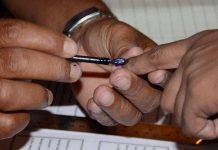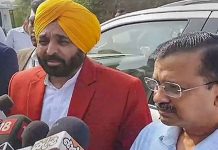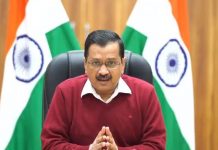By Aastha Atray Banan
 |
 |
AT THE AGE OF 13, the spirits of the ouija board told Shylaja Gopal that her husband’s name would be Murtuza. She laughed it off, but her mum wrote it down on a paper and kept it, reminded of her own teenage experiments with the ouija board. In 1998, when Shylaja was working as a stewardess based in Chennai, she met a purser called Murtuza Rai on a flight. But at that time, there was another problem — she had a Muslim phobia. “I couldn’t help it. There have been so many terror incidents of late that one tends to be wary,” says Shylaja, 33, sheepishly. Tracing her old prejudices, she says, “I had a friend who had a Muslim boyfriend who would treat her very badly. He wanted to know where she was, who she was with, would tell her what to wear. I just assumed that he behaved that way because he was Muslim,” she says. But one evening spent with Murtuza in Delhi after they flew together was enough to erase her ill-formed apprehensions.
“Once you meet a person who challenges your preconceived notions and prejudices, you can’t help but get swept off your feet. We started dating a month or so after meeting each other,” says Shylaja. They spent four years flying together, getting to know each other better and playing very competitive pool. Finally, it was time to tie the knot. But then, there was a new problem. Shylaja belonged to a Hindu family from Kerala, while Murtuza was the son of a Punjabi father and a Muslim mother. Her parents were quiet and conservative, while he hailed from an Army background and had grown up in a liberal atmosphere. “It was hard to break the news to my parents. I had thought I would have an arranged marriage. My parents had been showing me pictures of potential matches for some time. I told Murtu, ‘you better get married to me or I am picking one of the photos’,” Shylaja remembers. “I knew opposition was inevitable, though later my mum told me she had reconciled to the ouija board’s predictions,” she says.
Everyone had an opinion and they expressed themselves often. “There was bound to be a clash of cultures, but they were in love, so I was sure it was obviously going to sort itself out,” says Ashwin Shetty, Murtuza’s best friend and former roommate. Shylaja’s best friend, Ramya Rai, was not as optimistic. “When you are younger, you think so differently. He was a Muslim and I tried to talk her out of it. I reminded her of how different their backgrounds were. What if he changed after marriage?” she says, adding, “Also, he never liked her partying too much with me when he wasn’t around. So he and I didn’t like each other. I didn’t think it would last,” she says, “but then I saw she was happy with him. So I changed my mind.”
“What was most time-consuming and annoying for both families was deciding a way in which to get married. South Indian, Islamic or Punjabi — that really got everyone’s goat. We finally decided on the safe option of getting our marriage registered,” laughs Murtuza, watching their one-and half-year-old son Rehaan run around. “After that, nobody said anything. Her parents got to know me, and mine got to know her. So they settled down quickly. And now with a grandson, nobody even remembers us anymore.”
TODAY THEY have got everything going for them. Shylaja works for a shoe retail brand, while Murtuza is an aviation trainer. They still are competitive pool players but their son takes up most of their time. Their relationship seems unhurried, relaxed and devoid of drama. “That’s because love is friendship even though that phrase has been a cliché since Kuch Kuch Hota Hai, but that’s why we work. I point out the hot girls to him whenever we go out,” she says. So has she got over her Muslim phobia completely now? “Not really,” she guffaws, “I still tease him every time something happens. In fact… ” He intervenes, “She refers to it all the time. Right now with my French beard, I am called a terrorist. Damn that Bin Laden!”
Photo: MS Gopal
 |
 |
‘My parents couldn’t believe I was rebelling for a Catholic boy’
By Aastha Atray Banan
SHRADDHA KENY’S parents had a simple historical fact to cite when they opposed her marriage to Noel D’cunha, a middle-class Catholic boy. The Saraswat Brahmin family from Goa had been hearing tales of the Christian crusade against the Hindus in Goa. The duo met at the National Institute for the Hearing Handicapped in Mumbai, where Shraddha was an audiologist and Noel was the PA to the director. When they did get married, Shraddha’s father refused to speak to her. But Noel cuts in and smiles, “I think another reason that upset her family was that I was not as well off.” Despite his fury, her father attended the wedding. “I knew he couldn’t stay angry forever. And once they really got to know Noel, I was sure they would like him. But my brother never adjusted, and we don’t even speak to each other now,” says Shraddha. They cook together, take long walks together, but their son Pancham, 14, is their biggest indulgence. “When I cook beef, he asks, ‘Mama, you are killing your mother?’, and I just say I am only cooking for my son and husband.” So would they let their son marry a girl of his choice? “I want him to become a priest and never get married,” says Noel with a big grin.
Photo : Nikita Sawant
‘Even the passport office questions our marriage’
By Aastha Atray Banan
 |
 |
VJ MINI Mathur almost missed meeting her husband, director Kabir Khan, all because she was going to refuse a TV project, citing date troubles. Even Kabir, who was the director of photography for the project, was planning to step away. But as Mini puts it, the day they saw each other “alarm bells rang”, and they ended up completing the project so that they could be with each other. But though it was love at first sight for the couple, Mini knew it was not going to be smooth sailing. “I am a Mathur from Delhi, and Mathurs only marry Mathurs. So the fact that I wanted to marry a Pathan was going to be a hard pill to swallow for my family. So we planned to take a slightly different approach.”
Their slightly different approach turned out to be a brilliant plan. Mini slowly introduced Kabir into her home as a friend — a friend who wowed her father with his knowledge of the world. “He used to travel a lot, and would send me formal postcards. Those postcards were actually meant to be seen by my father, so that he would know what a worldly man Kabir was,” she laughs. “After a few years, my parents asked me why I wasn’t considering Kabir as husband material. My father said that ‘the difference between a Khanna and a Khan is just NA, and that means Not Applicable.”
FOR KABIR, introducing his would-be bride was simpler. His father, a Pathan, had eloped with his mother who was a Telugu. “My grandfather was a high court judge in Hyderabad and was very conservative. My parents went to America to study and got married there, and that caused problems in both families for some time. The fact that they went through such an experience made sure that in our home, we were never raised to give religion that much importance,” says Kabir who has directed films like Kabul Express and New York. The couple got married, keeping both Hindu and Muslim rituals in mind. “We had a registered marriage but I also insisted on having mock pheras, and then dressing up in a sharara for my reception,” she says. Mini admits that cultural differences are inevitable. “For example, they don’t read the namaz but I do the puja.”
The couple’s relationship came into the public eye in 2009 when the director landed up at the passport office as he wanted to visit his wife in Malaysia. A government officer asked him, “How can a Mathur be married to a Khan and how can his wife have a different name and that too from another community?” Kabir was shocked. “Who are these people to ask me that when my Constitution gives me the right to marry who I want?”
After 11 years of bliss, they are now the parents of Vivaan, 7, and a year-old Sairah whose last names are simply Kabir. “For them to understand what their last name means, they need to know what religion is. They also have the freedom to marry who they want. By the time they grow up, this will become a non-issue,” says Mini, concluding, “love is defined by intellectual and emotional bonding. What role can religion play?”
‘My biggest adjustment after marriage was learning Marathi’
By Rishi Majumder
 |
 |
SHALINI THACKERAY, the Mumbai North West candidate for the Maharashtra Navnirman Sena (MNS) was a prime talking point during the 2009 Lok Sabha elections. Why? Like any other MNS contestant, she espoused the Marathi manoos cause and justified party president Raj Thackeray’s hate campaign against north Indians in the state. And going by the Thackeray family’s protracted list of entrants into Maharashtrian parochial politics, the fact that Shalini is a Thackeray doesn’t stand for much novelty either.
Or doesn’t it? Shalini Thackeray, before her marriage to Jeetendra Thackeray was Shalini Bhagat, a girl from a Punjabi Sikh family based in Rae Bareilly, Uttar Pradesh. She was a ‘north Indian’ by even the MNS’ narrow definition of the phrase. Raj Thackeray likes to set himself apart from other leaders who trade on identity politics. In one of his speeches he had said that by ‘north Indians’ he refers only to those from Rajasthan, UP and Bihar.
But all this was before Shalini’s marriage to Jeetendra Thackeray. In 2009, if Jeetendra’s cousin Raj was the hot new face of Maharashtrian intolerance, Shalini was his sweet foil. Her very existence, it was hoped, would usher in universal appeal for the MNS. Someone had to explain to the world that Raj Thackeray had nothing personal against the north Indians he was lambasting in Shivaji Park and asking to leave. And who better than his north Indian sister-in-law to do so?
Shalini and Jeetendra had met as students in RA College of Commerce, Mumbai. Shalini had run the family business for years before joining politics and is proud of the MBA she acquired in the US. But Jeetendra and Shalini have been with the MNS camp since its inception. Jeetendra was Shalini’s campaign manager during elections. “Joining active politics wasn’t on my mind at all when I first came into the family,” says Shalini. Today, as someone firmly entrenched within the MNS, Shalini is careful to measure everything she says about her family. “Yes, there were adjustments I had to make when I got married,” she admits. This she follows with an instant disclaimer: “But they are the adjustments any girl who gets married into a family with a different cultural background would have to make.” Ask her what the biggest adjustment was in the process of becoming a Thackeray bride and she responds, “Well — the language. I used to know only smatterings of Marathi. But after marriage I had to make it my own.”
ONE IMAGINES that it isn’t easy being a Thackeray. While many individuals who marry into that culture might choose not to adopt the ethos and retain their own, one would imagine that Shalini did not have that option.
But she protests this assumption vociferously: “There was no pressure on me. I chose to accept my family’s tradition and legacy.” And again, she likens all her fears about marrying into the Thackeray family with the “fears any girl marrying into a family with a different cultural background would have.”
What about her children? What if they married non-Maharashtrians? Or ‘north Indians’? “Why look into the future?” she asks. “I will bring them up with an excellent sense of sanskaar. And then I’ll let them make their own choice when they’re at the right age to do so.”
Why look into the future? Because 36 years ago, a fiveyear- old Sikh girl had come into Mumbai from Bareilly. Today that girl is a 41-year-old woman. The woman who says Raj Thackeray is sadly misunderstood is firm that there must be a “cut-off point for migrants into the state”. The catchphrase of her 2009 poll campaign was: “I can cook both puran poli as well as kadhi chawal.”
 |
 |
‘Mother forbade me from marrying into a shepherd family’
By Anumeha Yadav
MUSIC TOH banaata hai par kaam kya karta hai?” Her mother’s question haunted Bhavana Yadav when she decided to be with music composer Priyadarshan Pathak. Being the eldest daughter of a Yadav family, marrying a middle-class Brahmin boy was forbidden. Yet when they met at Shovana Narayan’s kathak class in 1994, they couldn’t help but fall in love. Family intervention followed soon after. “My uncles threatened to cut off all ties. One day, after spending four hours explaining my point of view to my mother, she asked me, ‘She is still from a shepherd family, isn’t she?” says Priyadarshan. When he moved to Mumbai to try his luck in Bollywood, Bhavana started facing pressure to meet arranged matches. But their resolve to be together led them to tie the knot in 2000. Not that the years after marriage were perfect. Bhavana struggled to cope with her new life in Mumbai. It was three years before she started her current job as a psychologist. Priyadarshan is still waiting for a break in Bollywood, though he has composed music for teleserials on Doordarshan. Ask them about one thing that has come easily to them and the duo echos, “All these years of togetherness.”
Photos : Nikita Sawant, Tumpa Mondal











